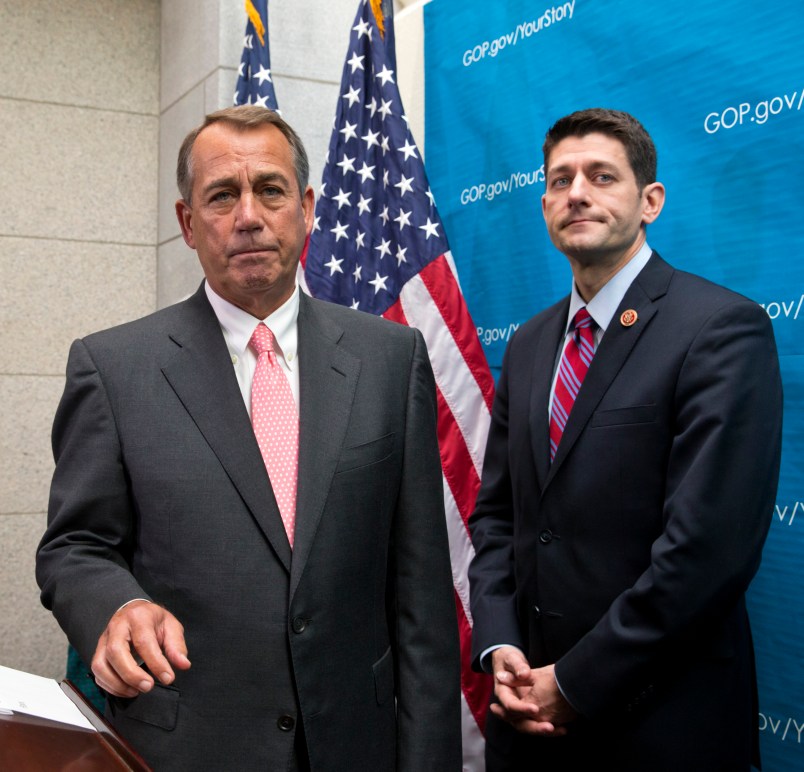Will the federal government shut down again just one month before the election?
When lawmakers return to Washington next Monday, a bitterly divided Congress will have just 10 scheduled working days to secure an agreement to avoid a shutdown.
The task before House Speaker John Boehner (R-OH) is to pass two items, and to do it quickly:
- A short-term “continuing resolution” to keep the government funded beyond Sept. 30, when money is scheduled to expire. (It’ll likely last into December.)
- A short-term reauthorization of the Export-Import Bank past Sept. 30, when its current charter is set to expire.
If the Republican-led House passes those two items — without extraneous policy add-ons — and sends them to the Senate, a government shutdown is all but off the table.
“That’s the way to avoid it,” a well-placed Democratic Senate aide told TPM. “I think the Senate would go for that.”
The good news for Boehner is that unlike last year, when conservative fury over Obamacare reached a fever pitch during the summer, there’s less of an appetite among Republicans for a shutdown confrontation so close to the Nov. 4 midterm election. And the two parties have agreed on a discretionary funding level of $1.014 trillion for fiscal year 2015.
The bad news is that there remains the possibility of a rebellion within the capricious House Republican conference.
There are the three landmines that could blow up the effort.
The first is the top issue roiling the Republican base: the prospect of a massive executive action by President Barack Obama to halt deportations for up to millions of people living in the U.S. illegally. Lawmakers like Rep. Steve King (R-IA) and Sen. Marco Rubio (R-FL) have lambasted Obama and suggested inserting a provision in the funding bill to block his move. That prospect could be moot if the White House opts to delay the announcement until after the election, which it is said to be considering.
The second is a possibility that has animated Republicans: including a provision in the continuing resolution to reverse Obama’s strict new pollution rules on coal-fired power plants. Republicans overwhelmingly want to roll back the move, and members in the House and Senate have sought to use the budgeting process to reverse Obama’s action.
The third is the reauthorization of the Export-Import Bank, which financially supports the sale of U.S. exports abroad. Many Republicans want to shut down the bank, knocking it as a bastion of crony capitalism and corporate welfare. But Democrats say they won’t let that happen, and have suggested they’ll demand it as part of a continuing resolution to keep the government open.
It’s not clear whether Boehner could be persuaded to link immigration or climate change to the funding debate. Both are doomed to fail in the Democratic-led Senate, and senior Republicans want to avoid a self-destructive confrontation that could imperil their advantages in the House and their prospects of winning control of the Senate. But then again, GOP leaders also wanted to avoid the Obamacare confrontation last year before the right’s passions forced their hand.
As for the Export-Import Bank, House Budget Chair Paul Ryan (R-WI) has said to expect a short-term reauthorization to punt the debate until after the election. The trick there is to get enough Republicans to at least tacitly accept the need to put off that fight, even if they won’t vote to renew the bank’s charter. Democrats support Ex-Im broadly enough that a short-term reauthorization is very likely to pass the House.
Boehner isn’t likely to announce any decisions until Congress returns.







Don’t over-think this. When the GOP shuts down the government again, they’ll just say that President Obama made them do it, to protect the American people. That way, they don’t have to justify their actions any further. Just watch it happen.
The House is still in the hands of the weakest Speaker of the House in several generation. He’s already shown the inability to control the nuts in his own caucas. If they whine enough he will cave into their idiotic demands. Stock up on supplies for a shut down is certainly a possibility coming from the clown show.
“When lawmakers return to Washington next Monday, a bitterly divided Congress will have just 10 scheduled working days to secure an agreement to avoid a shutdown.”
Ten work days,what a piece of crap these people are.And the GOP is supposedly going to keep the House and possibley take over of the Senate ? If that happens I don’t want to hear a peep of people complaining if they don’t get out and vote to stop this nonesense.
Look at the expressions on Boehner’s and Ryan’s faces. While I am not sure when the photo is from, they look like stooges, don’t they?
Guess they’re depending on past successes…
Oh …Never mind.